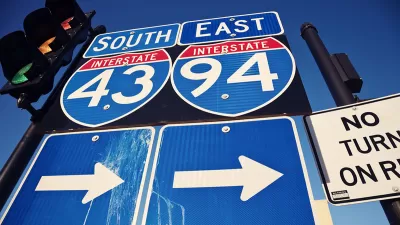Some people call it a road-building program. Others call it "an all out war on urbanism."
Michael Grunwald has produced a large, magazine-style feature for Politico's "The Agenda" series. The feature examines the city of Milwaukee's "addiction to megahighways" as an examples of a proclivity found all over the country.
Grunwald begins by describing the Marquette Interchange, completed in 2008, as the "largest and most complex road project in Wisconsin's history."
"Seven years later, though, the Marquette is no longer an outlier. The state is already building or planning three larger freeway projects in the Milwaukee area alone; the expansion and reconstruction of the nearby Zoo Interchange will cost more than twice as much as the Marquette. It’s all part of a $7 billion effort to widen and modernize the interstates around the city, an effort so massive it has its own line item in the state budget, 'Southeast Wisconsin Freeway Megaprojects.'"
The state's desire to build so many highways, at such extravagant cost, has informed some of Governor (also presidential candidate) Scott Walker's most heated political controversies, including his own party rejecting his road-building program, thus leaving the state budget in limbo, and a federal court ruling that the Wisconsin DOT used faulty projections to justify a highway widening project.
The article relates the example of Milwaukee and Wisconsin to a larger debate—fueled by the ongoing struggles of Congress to produce a long-term transportation-funding bill—about how much should be allocated for maintenance of existing infrastructure versus new construction.
Grunwald also calls on John Norquist, former mayor of Milwaukee and former president of the Congress for New urbanism, who is quoted in the article speaking bluntly about the effects of the Wisconsin road-building program. "It’s an all-out war on urbanism," says Norquist.
FULL STORY: Overpasses: A love story

Maui's Vacation Rental Debate Turns Ugly
Verbal attacks, misinformation campaigns and fistfights plague a high-stakes debate to convert thousands of vacation rentals into long-term housing.

Planetizen Federal Action Tracker
A weekly monitor of how Trump’s orders and actions are impacting planners and planning in America.

San Francisco Suspends Traffic Calming Amidst Record Deaths
Citing “a challenging fiscal landscape,” the city will cease the program on the heels of 42 traffic deaths, including 24 pedestrians.

Defunct Pittsburgh Power Plant to Become Residential Tower
A decommissioned steam heat plant will be redeveloped into almost 100 affordable housing units.

Trump Prompts Restructuring of Transportation Research Board in “Unprecedented Overreach”
The TRB has eliminated more than half of its committees including those focused on climate, equity, and cities.

Amtrak Rolls Out New Orleans to Alabama “Mardi Gras” Train
The new service will operate morning and evening departures between Mobile and New Orleans.
Urban Design for Planners 1: Software Tools
This six-course series explores essential urban design concepts using open source software and equips planners with the tools they need to participate fully in the urban design process.
Planning for Universal Design
Learn the tools for implementing Universal Design in planning regulations.
Heyer Gruel & Associates PA
JM Goldson LLC
Custer County Colorado
City of Camden Redevelopment Agency
City of Astoria
Transportation Research & Education Center (TREC) at Portland State University
Jefferson Parish Government
Camden Redevelopment Agency
City of Claremont





























